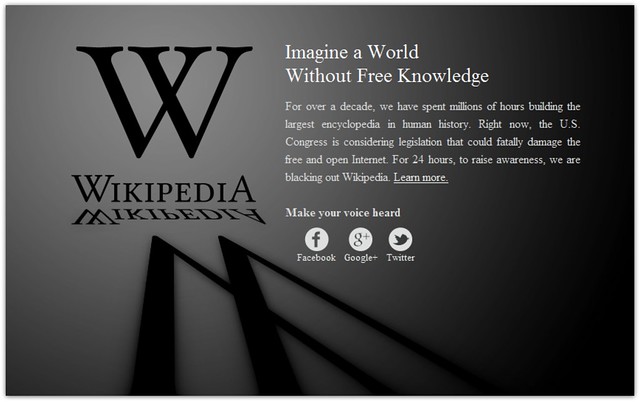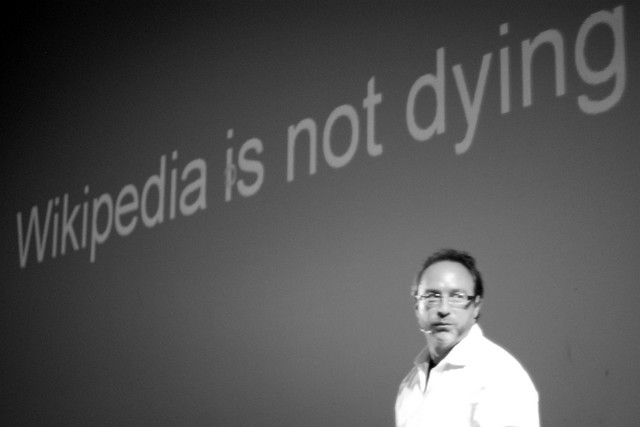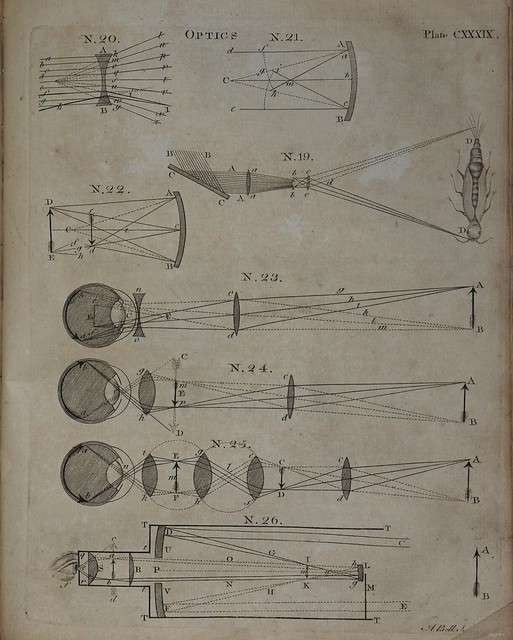In another turn of digital fate, NYTimes reads the following about Encyclopaedia Britannica:
After 244 years, the Encyclopaedia Britannica is going out of print. In an acknowledgment of the realities of the digital age — and of competition from the Web site Wikipedia — Encyclopaedia Britannica will focus primarily on its online encyclopedias and educational curriculum for schools. The Britannica, the oldest continuously published encyclopedia in the English language, has become a luxury item with a $1,395 price tag. It is frequently bought by embassies, libraries and research institutions, and by well-educated, upscale consumers who felt an attachment to the set of bound volumes. Only 8,000 sets of the 2010 edition have been sold, and the remaining 4,000 have been stored in a warehouse until they are bought.The NYTimes readers say:

Steve FankuchenOakland, CA
This article makes a truly dubious statement: "...Wikipedia, which in 11 years has helped replace the authority of experts with the wisdom of the crowds." In many instances it would be more accurate to reverse the uses of "authority" and "wisdom" saying, instead, "...Wikipedia, which in 11 years has helped replace the wisdom of experts with the authority of the crowds."
While in some cases Wikipedia works quite nicely, in many others it is simply another expression of the increasingly common reality of confusing opinion with news.
In any case, "voting"/crowd sourcing does not establish accuracy, especially if the subject is conceptual. It is democracy as religion, so to speak.
The Britannica was like the three networks: though bland and middle-of-the road, they were at least accountable, vetted for a concept of accuracy, and provided a common reality/interpretation with which people could agree, disagree, and constructively argue about, thereby improving our collective level of understanding.
JenofNJNJ
Sorry, but I do not consider OpinionPedia to be a substitute for an authoritative encyclopedia. Too much junk on it, as well as gaming the system. Call me old-fashioned; I like *reference* books.
Ralph P.New York
My mother bought a set of the Encyclopedia Britannica just before I started high school. We didn't have a lot of money, and this was a huge sacrifice for the family. At the same time, she also got rid of the only television set we had in the house. With nothing else to do, I started reading the encyclopedia, letting a subject lead me into another, until I eventually got through most of the volumes. Soon, I was reading the classics and checking out books from the library. I developed an appetite for reading. I succeeded in high school and got into the university of my choice. I think Britannica had a lot to do with it.
Ricky BarnacleSeaside
I always wanted a set for myself as a kid but we couldn't afford it.
My grandmother had a set from the 1940's and when Mom and Dad dropped off the kids for the Saturday babysitting routine, I'd pull out a random letter, curl up on a chair in Grandma's living room and stay up late reading, looking at the photos and basically dreaming about all the fantastic people, places and things on this planet.
All of the other kids were in watching TV -- not me, I loved those books! And they taught me plenty. Sorry to see them go.
westiePhiladelphia, PA
We also own a 1960 version... It is FAR superior to any current information on such things as Cleopatra, Hammurabi's code, Alfred Nobel, etc, etc..... anything that took place a long time ago has an exhaustive article that is unmatched!!!!!
BeliavskyBoston, MA
I used to browse the World Book encyclopedia as a kid. I think print versions of sets of encyclopedias that are a few years old are worth buying used for $100 or so. Kids and adults may browse them more than the online version.
 |
| From a reproduction first edition of the Encyclopedia Britannica for the utata reader weekend project |
I listened to a very interesting podcast of Simon Winchester talking about the history of the Oxford English Dictionary. In it, he described the way in which data was collected for the first edition of the dictionary: lay contributors from the entire English speaking world were asked to write any word they saw in print, along with a definition, pronunciation guide and a citation of the written work containing the word in context. These were to be mailed to England, to be sorted and compiled into the Dictionary.
So, the use of contributions by ordinary people in an archetypal reference work has a long and honorable history. The OED is, in fact, the progenitor of today's Wikipedia!
LJ EvansEasthampton, MA
You clearly have no idea what peer review is about, or you would never say such a ridiculous thing. ANYONE can edit a Wikipedia article, whether they know diddly about a subject or not. Peer review is the submission of a proposed piece of scholarship to actual experts and fact checkers. They are not even vaguely similar.
PaulAtlanta
It's more than about accuracy. Wikipedia articles are often poorly written, and some are downright excruciating--newsy, promotional, way too many words or too few--despite the good work of an obviously insufficient band of roving editors. This matters, because comprehension depends on communication. Too often, the "crowds" can't write.
Every source has its problems. There have been studies showing that Wikipedia actually has fewer errors than the print versions of the Encyclopedia Britannica. Largely because errors in an online, crowd sourced encyclopedia get corrected.
Crowd sourcing does not guarantee accuracy, but then neither does one expert opinion. You can certainly find obscure and/or controversial topics where the Wikipedia entry is suspect. But Encyclopedias only avoided that problem by avoiding the topics all together or focusing only on one narrow, non-controversial narrative. That may be reassuring for those looking for "authority", but it does not make for a very complete source of information.
SherieNV
This decision is a disaster for the future. One of my treasures is a set of the 11th edition of the Britannica. Published in 1911, it has always had the reputation of being the best reference to go to for historical events and people up to that date. Long after many versions of web pages can no longer be read, my children's children will be able to sit down with that set and find out what made the world tick in the 19th century and in centuries before that.
RalphSan Francisco
Sad, yes. Nostalgic, yes. Inevitable, yes.
georgesanders---
Which of course would be trumped a millionfold by the errors found in Wikipedia. Every day millions of people world-wide are adding mistakes, fiction, rumor, and b.s. to Wikipedia. Much of this gets filtered out eventually (and more added!), but one can never be certain at any given time what is accurate and what not."In the long run" truth will out is the refrain of the Wikipedians, but as Keynes noted, in the long run we are all dead. In the meantime, it is unreliable.
MikeAustin, Tx
Wikipedia follows a process similar to the highest standard in publication: peer review. The EB may have survived if they invited more authorities to review their work and expand the number of articles.
Just to rub their face in it, the Wikipedians compiled the following error list:
http://en.wikipedia.org/wiki/Wikipedia:Errors_in_the_Encyclopædia_Britannica_that_have_been_corrected_in_Wikipedia#Wikipedia
 |
The Internet is becoming the town square for the global village of tomorrow. --- Bill Gates |
"Peer review" in the academic profession assumes that the peers are experts. "Peer review" in Wikipedia involves the contributions of many people who know next to nothing about any given subject, often can't write, and rarely have any sense of what distinguishes reliable information from empty opinion.
Wikipedia serves well as a means of doing a quick check on basic information (to be double-checked elsewhere) and a starting point for research (now that bibliographies are increasingly included). But the reliable information that appears in Wikipedia is almost completely parasitic on the work of real scholars bound by professional standards.
In addition, the gatekeepers Wikipedia uses often are ignorant of the subjects they are supposed to be supervising and are not bound by the sorts of professional rules one finds in the university system. I discovered one of these gatekeepers insisting that references other Wikipedia entries were considered more reliable as a measure of any composer's professional standing than a references to real-world sources. I tried in vain to get this person to understand that performances of a composer's work by leading ensembles, or a prize granted a composer by one of the leading institutions in the world of music were real-world measures of professional standing. For him, all that counted was Wiki-world standing.
So, no, I do not consider Wikipedia "open-sourcing" to constitute anything remotely resembling peer review.
 |
"...this might make me weird butI read the Encyclopedia for fun." |
doy1NYC
There's nothing like randomly leafing through an encyclopedia and discovering an entire subject that was previously unknown - delving into this subject - then being led to related subjects and ultimately, other sources.
It begins with knowledge for the sake of knowledge - stimulating a thirst for more, whether expanding on a subject or narrowing down the search for more detail. This truly opens one's mind and imagination.
Who searches randomly through the internet? The adventure of leafing through print reference books just can't be replicated via the internet.
My parents made the considerable financial sacrifice to purchase the EB when I was a child - NOT in an attempt to gain "status" (which would have been more easily attained by buying a new car) - but to open their children's minds and give us access to the whole world at our fingertips at any time. As a result, our apt. was a magnet for the entire neighborhood - & a place of lively discussion & debate.
So sad that children won't have that experience anymore. Yes, I'm grateful that the online version of EB will continue - glad that it will still provide authoritative, accurate information - but it's just not the same.
RobertBoston, MA
When I was introduced to online researching back in 1983 (!) the librarian who helmed the class told us that the great sorrow of computerized searching would be the loss of serendipity -- the accidental discovery of new worlds on the way to the one you wanted. That is the great value in the physical EB volumes that will be missed. What greater joy than finding something completely new on the way to something that you already knew existed. WP, of course, tries to recreate the experience with its homepage "Featured article" and "Did you know..." bits. However, it's not the same as the joy of losing yourself in wonder within the entry _before_ the one you meant to find. Most of the young people whom I know in the Google generation have no clue about that type of immersive learning-for-the-joy-of-knowing. They certainly won't get it from WP or Google searches. Everyone in our household has a computer with a connection or a smart phone. We use them. However, to shore up the bulwarks of civilization, we still haul out our '72 EB to the dinner table when questions of history, etymology, or plant biology arise. Out of date? Sure. Worth the ride? Always.
SteveJayNew York
So fix the Wiki entries. That's what crowd-sourcing is all about.
Steven McGeadyPortland, OR
This story conflates two trends, one important and inevitable, and one less so.
The death of the printed encyclopedia is long in coming. Shipping, storing, and using a 32-volume set of books that need to be regularly updated is not economically viable, nor is it the best way (or the only best way) to access reference information. The death of the printed encyclopedia is part and parcel of the dramatic changes wrenching the whole publishing industry.
The view that Wikipedia is the worthy successor, however, is misbegotten. On any given topic and at any given moment, Wikipedia is likely to contain thousands of howlingly incorrect statements masquerading as facts, and thousands of biased, inaccurate, or incomplete articles masquerading as knowledge. Many of them are even properly sourced, to primary sources themselves boneheaded or bent.
Wikipedia lacks expert voices. Britannica had 4000 authors? That is probably more than are truly active on Wikipedia, and each of Britannica's 4000 are experts. As someone said "Twenty teen-age idiots plus one expert are indistinguishable from twenty-one idiots."
Wikipedia may be a useful tool for determining the cast list from "Gilligan's Island" or the attributes of a particular Pokemon, but as an encyclopedia it is meretricious, an attractive hazard to scholars young and old.
 |
| Wikipedia's founder Jimbo Wales at the closing ceremony of Wikimania 2011 in Haifa, Israel. Since in the days before some newspapers wrote that Wikipedia was dying he felt he had to make clear that wasn't true |



No comments:
Post a Comment